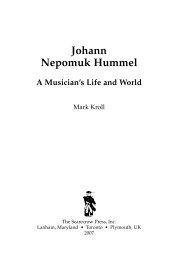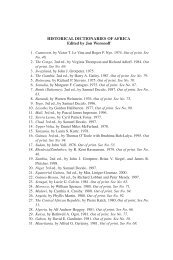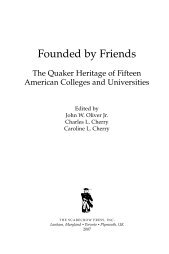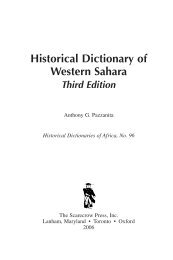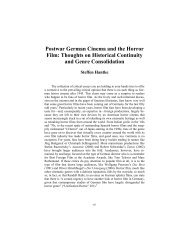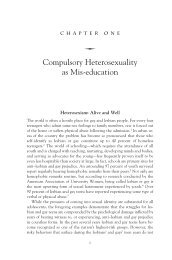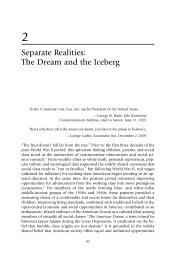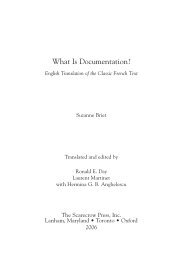Historical Dictionary of the Gypsies (Romanies) - Scarecrow Press
Historical Dictionary of the Gypsies (Romanies) - Scarecrow Press
Historical Dictionary of the Gypsies (Romanies) - Scarecrow Press
Create successful ePaper yourself
Turn your PDF publications into a flip-book with our unique Google optimized e-Paper software.
INTRODUCTION • xliii<br />
ternational Romani Union. The fourth Congress in Warsaw in 1990—<br />
as <strong>the</strong> political changes in eastern Europe began—saw <strong>the</strong> attendance<br />
for <strong>the</strong> first time <strong>of</strong> delegations or individuals from Romania, <strong>the</strong> Soviet<br />
Union, and even Albania. The fifth Congress was held in Prague<br />
with considerable support from <strong>the</strong> Czech government and international<br />
organizations. The emergence <strong>of</strong> <strong>the</strong> rival Romani National Congress<br />
has, however, not helped <strong>the</strong> <strong>Gypsies</strong> to present a united front for<br />
<strong>the</strong>ir aspirations.<br />
The idea <strong>of</strong> Romanestan, a homeland for <strong>the</strong> <strong>Gypsies</strong>, emerged in<br />
Poland in <strong>the</strong> 1930s, clearly influenced by <strong>the</strong> Zionist movement. Since<br />
1945 this has not been seriously considered, though many intellectuals<br />
are fostering <strong>the</strong> link with <strong>the</strong> “Mo<strong>the</strong>rland” <strong>of</strong> India. Two festivals have<br />
been held in Chandigarh (Punjab) to which Gypsy intellectuals and musicians<br />
were invited from Europe. Some Gypsy writers have introduced<br />
Hindi and Sanskrit words into <strong>the</strong>ir poetry.<br />
RECENT POLITICAL CHANGES IN EASTERN EUROPE<br />
With <strong>the</strong> fall <strong>of</strong> <strong>the</strong> totalitarian regimes in Eastern Europe came a new<br />
freedom to form organizations. The new opportunities for travel both<br />
from and to Eastern Europe have enabled <strong>the</strong> holding <strong>of</strong> international<br />
Gypsy festivals such as those in Bratislava and Gorzow, in addition to<br />
formal conferences. Newspapers opened as fast as pavement cafés. The<br />
<strong>Gypsies</strong> who had never completely forgotten how to trade privately<br />
were <strong>the</strong> first to set up small businesses. Their ability to survive <strong>the</strong><br />
changes better than <strong>the</strong>ir compatriots led to jealousy and an outbreak <strong>of</strong><br />
anti-Gypsy violence in Poland. The road to capitalism was not as<br />
smooth as had been expected, and with no Jews to act as scapegoats,<br />
<strong>the</strong> population <strong>of</strong> Eastern Europe in general turned to <strong>the</strong> <strong>Gypsies</strong> as <strong>the</strong><br />
reason for <strong>the</strong>ir real or imagined troubles.<br />
Freedom also meant freedom for right-wing racists to organize, and<br />
this movement was facilitated by a falling away <strong>of</strong> <strong>the</strong> control previously<br />
exercised by <strong>the</strong> police. As early as January 1990, a crowd <strong>of</strong> 700<br />
Romanians and ethnic Hungarians attacked <strong>the</strong> Gypsy quarter in Turu<br />
Lung, Romania. Thirty-six <strong>of</strong> <strong>the</strong> 42 houses belonging to <strong>Romanies</strong><br />
were set on fire and destroyed. Two similar incidents took place that<br />
year in Romania, resulting in <strong>the</strong> death <strong>of</strong> four <strong>Gypsies</strong>. In September



